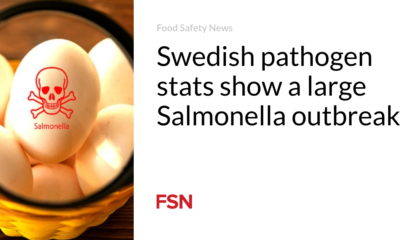Food
The results of the Danish campaign show uncertainty about the norovirus

According to the Danish Food Agency, there is still uncertainty among chefs and kitchen staff about how to tackle the norovirus.
A control and guidance campaign by the Danish Veterinary and Food Administration (Fødevarestyrelsen) targeted restaurants, kitchens and shops supplying ready-to-eat food (RTE). The work included 829 visits from June to November 2023.
The agency asked kitchen managers what steps they should take to prevent outbreaks. Some said they weren’t sure how far they could go when it came to an employee’s illness and health.
Scope of the issue
Norovirus is the most common cause of foodborne outbreaks in Denmark. The campaign focused on companies’ training of employees on personal hygiene, guidelines for informing staff and employers’ obligations to prevent contamination by foodborne viruses.
Danish officials said that if outbreaks are to be prevented and reduced, kitchen staff and plant managers must have the necessary knowledge to work in a hygienically correct manner and in a manner that minimizes the risk of food contamination with norovirus, and enable them requires responsible action if an incident occurs by informing management.
“Several kitchen managers have responded that they have not yet introduced procedures for dealing with norovirus and that they have not instructed employees on what to do if they are infected with norovirus,” says Lene Mølsted Jensen from the Danish Veterinary and Food Administration .
“Because a sick employee can be a danger to food safety, the kitchen manager can inquire about the complaints if the employee reports sick with stomach complaints, just as the employee must also inform the boss about stomach complaints.”
The results showed that all companies visited had sufficient procedures in place around personal hygiene, including employee behavior in relation to norovirus symptoms, so no sanctions were imposed.
However, the fact that there were 20 outbreaks with 790 cases in 2021 and 2022 points to a discrepancy between these findings and the companies’ actions in day-to-day operations. The Danish Veterinary and Food Authority said detecting problems with a single pre-announced inspection can be difficult.
Key audit findings
On two occasions, inspectors found that sites did not have the necessary facilities for workers to maintain high levels of personal hygiene. In both cases there was a lack of hand washing facilities.
More than half of the respondents in the questionnaire were not aware that the rules of the General Data Protection Regulation (GDPR) do not prevent them from asking about an employee’s possible complaints.
Less than half of the participants were aware of a guide from the Danish Veterinary and Food Authority with advice on preventing consumers from becoming infected with norovirus.
More than 60 percent of companies use the Danish Veterinary and Food Authority as their main source of information when seeking advice on a suspected incident. Other sources include industry associations and consultants.
In 2019, 2020 and 2021, outbreaks due to norovirus infection represented 37 percent, 17 percent and 22 percent of all recorded foodborne outbreaks, respectively. The number of confirmed norovirus outbreaks has increased from six in 2020 to fourteen in 2021.
The Danish Veterinary and Food Authority repeated parts of a control campaign from 2020/2021. The initiative is part of efforts against foodborne viruses from January 2019 to December 2023, in addition to the agency’s strategy and goal of reducing the number of people sickened by food.
Similar research from 2022 found that kitchen staff and food establishments had no knowledge of how foodborne viruses such as norovirus are transmitted and how to prevent the infection from being passed on to customers and colleagues.
Norovirus can spread through sick people, contaminated surfaces, or contaminated food and water. A person usually develops symptoms 12 to 48 hours after exposure. Most people with norovirus illness get better within 1 to 3 days, but they can still spread the virus for a few days. Kitchen staff should stay away from work for at least 48 hours after symptoms resolve.
(To sign up for a free subscription to Food Safety News, click here.)













